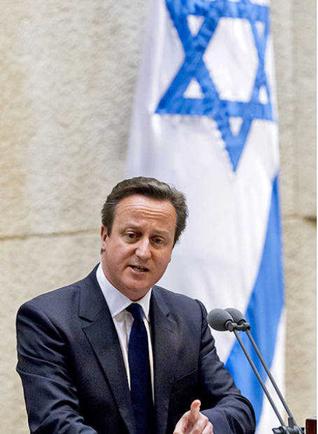Will the Real David Cameron Please Stand Up?

In March this year, EU leaders met to discuss the crisis in Ukraine. In a media statement, British Prime Minister David Cameron condemned Russia and said that the “territorial integrity of an independent nation has been violated” by Moscow’s action. “The aspirations of the Ukrainian people… are being crushed,” he thundered. “And Russia has acted in flagrant breach of international law.” Why was this important for the people of Britain? “Because we depend on a world where countries obey the rules,” insisted Cameron.
In July and August, during Operation Protective Edge, the prime minister refused to condemn Israel’s flagrant breaches of international law. When pushed to add his voice to that of the UN Secretary General in condemning the Israeli attack on a UN school, which killed 10 Palestinian children, Cameron told the BBC: “I’m not an international lawyer. It’s up to international lawyers.” He wasn’t so reluctant to voice his opinion about international law when it came to Russia in the Ukraine.
Indeed, even though he insisted in the summer that “international law is very, very clear: the use of force always has to be proportionate, that civilians should not be targeted”, he still pledged his “staunch support” for Israel’s “right of self-defence”. Of course, he isn’t an international lawyer, so perhaps he didn’t know that such a right does not exist for a state, like Israel, which is engaged in the military occupation of someone else’s land. His advisers would have known, though, but party interests have to come before legal niceties.
It was no surprise, therefore, to see that the leader of the Conservative Party has “reasserted his support for Israel” and told a pro-Israel lobby group this week that his party “would always stand behind ‘the homeland of the Jewish people’.” According to a report in the Jewish Chronicle, “The Prime Minister described Israel as an ‘oasis of freedom’ and the ‘symbol of success’ as he addressed more than 700 people at a Westminster lunch.” I wonder what Israel’s 1.5 million Arab citizens would say about that, given that Cameron’s Israeli counterpart plans to exclude them from national rights in the state.
Substitute Israel for Russia; Palestinians for Ukrainians; Tel Aviv for Moscow in his March speech and you will see what I mean about the prime minister’s hypocrisy. There has to be an election looming. Only such blatant electioneering could explain the difference between Cameron’s response to Russia’s actions in Ukraine and those of Israel against the Palestinians.
It is thus pertinent for us to ask if the prime minister supports international law or not. Does he mean it when he says that “we depend on a world where countries obey the rules”? If he does, then how can he give such unqualified backing to Israel and its government while knowing full well that it has not only broken international laws and conventions on numerous occasions but has also ignored more than 80 UN resolutions? On a domestic level, how can his government insist that children in British schools be taught about respect for “the rule of law” as a fundamental aspect of “British values” when he is so keen to endorse a rogue state like Israel?
He apparently “told supporters of Conservative Friends of Israel that the Jewish community shared Tory values on education and opportunity for all and urged British Jews to back him at next year’s general election.” No doubt the prime minister will play the double-standards card as long as it is politically expedient for him to do so, but we know, and he knows that we know, that Britain’s Jews are more influential than Britain’s Ukrainian community and this is all about votes and election funding, not love of Israel and its people. His staunch support will vanish as and when it suits him and his party to look for votes and money elsewhere.
All of us, Jews and Ukrainians included, should ask if we can really trust a man who is so openly two-faced to run our country. We should then ask the real David Cameron to stand up. Both of them.

